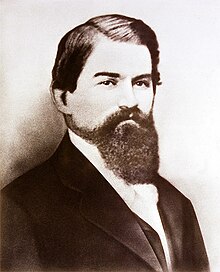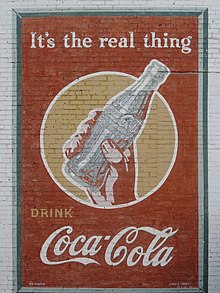19th-century historical origins
Confederate Colonel John Pemberton, who was wounded in the American Civil War and became addicted to morphine, began a quest to find a substitute for the problematic drug. The prototype Coca-Cola recipe was formulated at Pemberton's Eagle Drug and Chemical House, a drugstore in Columbus, Georgia, originally as a coca wine. He may have been inspired by the formidable success of Vin Mariani, a French-Corsican coca wine. It is also worth noting that a Spanish drink called "Kola Coca" was presented at a contest in Philadelphia in 1885, a year before the official birth of Coca-Cola. The rights for this Spanish drink were bought by Coca-Cola in 1953.
In 1885, Pemberton registered his French Wine Coca nerve tonic. In 1886, when Atlanta and Fulton County passed prohibition legislation, Pemberton responded by developing Coca-Cola, a nonalcoholic version of French Wine Coca. The first sales were at Jacob's Pharmacy in Atlanta, Georgia, on May 8, 1886. It was initially sold as a patent medicine for five cents[= a glass at soda fountains, which were popular in the United States at the time due to the belief that carbonated water was good for the health. Pemberton claimed Coca-Cola cured many diseases, including morphine addiction, indigestion, nerve disorders, headaches, and impotence. Pemberton ran the first advertisement for the beverage on May 29 of the same year in the Atlanta Journal.
By 1888, three versions of Coca-Cola – sold by three separate businesses – were on the market. A co-partnership had been formed on January 14, 1888 between Pemberton and four Atlanta businessmen: J.C. Mayfield, A.O. Murphey, C.O. Mullahy, and E.H. Bloodworth. Not codified by any signed document, a verbal statement given by Asa Candler years later asserted under testimony that he had acquired a stake in Pemberton's company as early as 1887. John Pemberton declared that the name "Coca-Cola" belonged to his son, Charley, but the other two manufacturers could continue to use the formula.
Charley Pemberton's record of control over the "Coca-Cola" name was the underlying factor that allowed for him to participate as a major shareholder in the March 1888 Coca-Cola Company incorporation filing made in his father's place. Charley's exclusive control over the "Coca-Cola" name became a continual thorn in Asa Candler's side. Candler's oldest son, Charles Howard Candler, authored a book in 1950 published by Emory University. In this definitive biography about his father, Candler specifically states: "..., on April 14, 1888, the young druggist Asa Griggs Candler purchased a one-third interest in the formula of an almost completely unknown proprietary elixir known as Coca-Cola."
The deal was actually between John Pemberton's son Charley and Walker, Candler & Co. – with John Pemberton acting as cosigner for his son. For $50 down and $500 in 30 days, Walker, Candler & Co. obtained all of the one-third interest in the Coca-Cola Company that Charley held, all while Charley still held on to the name. After the April 14 deal, on April 17, 1888, one-half of the Walker/Dozier interest shares were acquired by Candler for an additional $750.








No comments:
Post a Comment